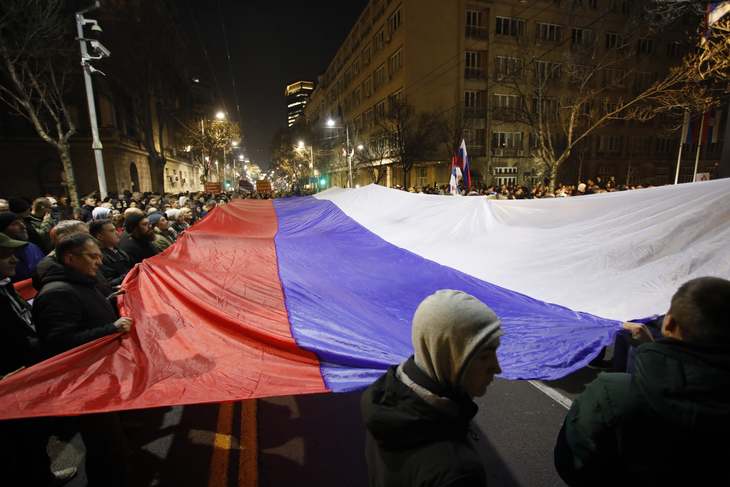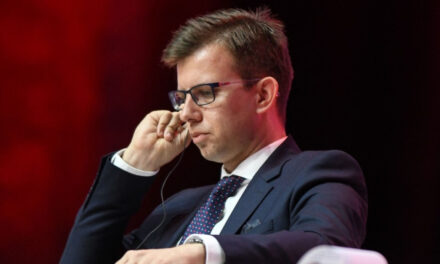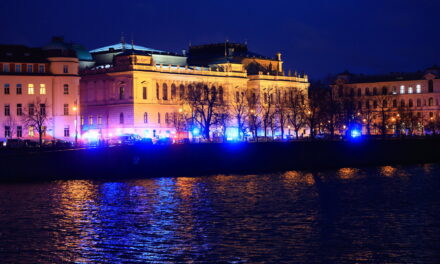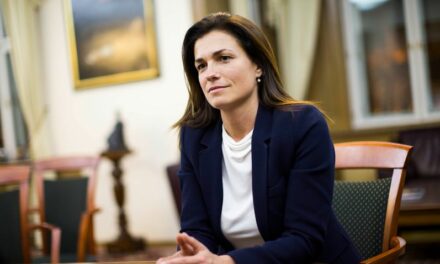They protested against the European settlement proposal on Kosovo on Wednesday evening in the Serbian capital. The participants of the demonstration threatened the president with death threats. In his late-night television interview, Aleksandar Vucic called for calm, and according to the foreign minister, there was an attempted coup in Belgrade. The stakes are not small, as the Prime Minister of Kosovo stated, the Franco-German proposal would practically mean the recognition of Kosovo's independence.
the V4NA report, the protesters objected to the fact that Serbian President Aleksandar Vucic accepted that Belgrade and Pristina continue the dialogue based on the originally French-German settlement proposal. The demonstration was initiated by the far-right organization Narodna Patrola, i.e. National Patrol. The participants waved the Russian national flag next to the Serbian one. On behalf of the organizers, Damjan Knezevic said: the members of Vucic's Serbian Progressive Party cannot call themselves Serbs, and instead of the Franco-German proposal, they support the Russian solution. They also demanded that Aleksandar Vucic resign or change his policy on Kosovo. Moreover, press reports , the head of state was threatened with death.
The gendarmerie prevented the participants of the demonstration from entering the office of the President of the Republic. Before that, the protesters demolished part of the fence protecting the building. The organizers of the disturbance marched to the main entrance of the presidential office with the intention of delivering their demands to the head of state Aleksandar Vucic. Among these expectations, the main one was that the country break the dialogue with Kosovo.
Weapons were also seized
press release of the Serbian Ministry of the Interior, the uniformed officers seized weapons from two persons in Vojvodina already in the afternoon. According to the suspicion, they also tried to attend the evening demonstration. A telescopic rifle and ammunition were also found with the mentioned persons. Those produced were members of the Narodna Patrola, the organization admitted on the Telegram channel.
After the demonstration, the Serbian head of state also spoke . Vucic said late in the evening: Serbia does not stand up to provocations, whether they come from the east or the west. The state wants to guarantee peace and tranquility to its residents.
"The state will not allow gangsters and extremists to threaten the constitutional order with any external help, Western or Eastern," said Vucic.
The Serbian president added : at least four parliamentary parties supported the organizers of the demonstration, and their representatives also participated in the demonstration.
"They knew what they were doing, everything was planned," said the head of state.
On Wednesday night, they were preparing for a coup and a violent takeover in Belgrade - this is how assessed the events. According to the Serbian foreign minister, it is obvious that the organizers of the demonstration were preparing a coup d'état attempt.
Franco-German practically means the recognition of the independence of Kosovo
The Franco-German proposal does not represent a final solution to the settlement of the relationship between Serbia and Kosovo, but it practically includes the recognition of Kosovo's independence, Prime Minister of Kosovo Albin Kurti announced on Thursday, in connection with the fact that his country celebrates the fifteenth anniversary of its declaration of independence on Friday.
According to the report of the website of Klan Kosova television in Pristina, the 11-point proposal, which has not been made public so far, is not final, but it is definitely binding. He added: Pristina considers the proposal to be fundamentally acceptable, but at the same time its details still need to be discussed, there are points that need to be clarified, especially the parts that talk about practical implementation, international guarantees, and the time sequence of the tasks to be implemented.
In 2008, Kosovo unilaterally declared its independence from Serbia, which Belgrade has refused to recognize ever since, and continues to consider the predominantly Albanian territory as its own southern province.
In 2013, a dialogue between the two parties on the settlement of the relationship began with the mediation of Brussels, but only a few of those formulated almost ten years ago were realized. Kosovo's independence is recognized by more than a hundred countries around the world, but Russia and China do not, and five of the 27 member states of the European Union - Spain, Slovakia, Romania, Greece, Cyprus - do not consider it an independent state either.
According to one point of the Franco-German solution proposal, Serbia cannot prevent Kosovo from being admitted to international institutions in the future, and Kosovo is obliged to establish a community of Kosovo Serb municipalities, which would ensure greater autonomy for the Serbian minority living in the northern part of the country.
95 percent of Kosovo's population of 1.8 million are ethnic Albanians, about fifty thousand live in the northern part of the country, and another fifty thousand live in the rest of the country, reports MTI.
The Serbs support the settlement, not the acceptance of Kosovo's independence
More than half of the Serbian population is ready to support the Franco-German proposal for settling the situation in Kosovo. According to a survey by the public opinion research company Faktor Plus, 57 percent believe that the document should be accepted, but only on the condition that Kosovo's formal recognition and support for admission to the UN are extracted from it. 33 percent of those surveyed do not support any form of the proposal, reports V4NA.com.
The topic also divides the population, this was revealed by the Faktor Plus survey. At the same time, the poll shows that only every fifth person is aware of exactly what the document contains. Vladimir Pejic, the head of Faktor Plus, said in this regard that although Kosovo is not the most important topic in people's everyday lives, if some kind of conflict takes place there, it becomes the center of attention. He added: the Serbian population is committed to resolving the situation and normalizing relations with Pristina, and is aware of the huge task the state leadership is facing on this topic. However, the respondents do not support the acceptance of Kosovo's independence. According to the survey, 80 percent of the respondents oppose the proposal of the five, if it would mean the acceptance of Kosovo's independence or its entry into international organizations. Only 9 percent see this condition as acceptable, and 11 percent answered maybe.
Civilek.info / V4NA / MTI
Photo: V4NA.com













